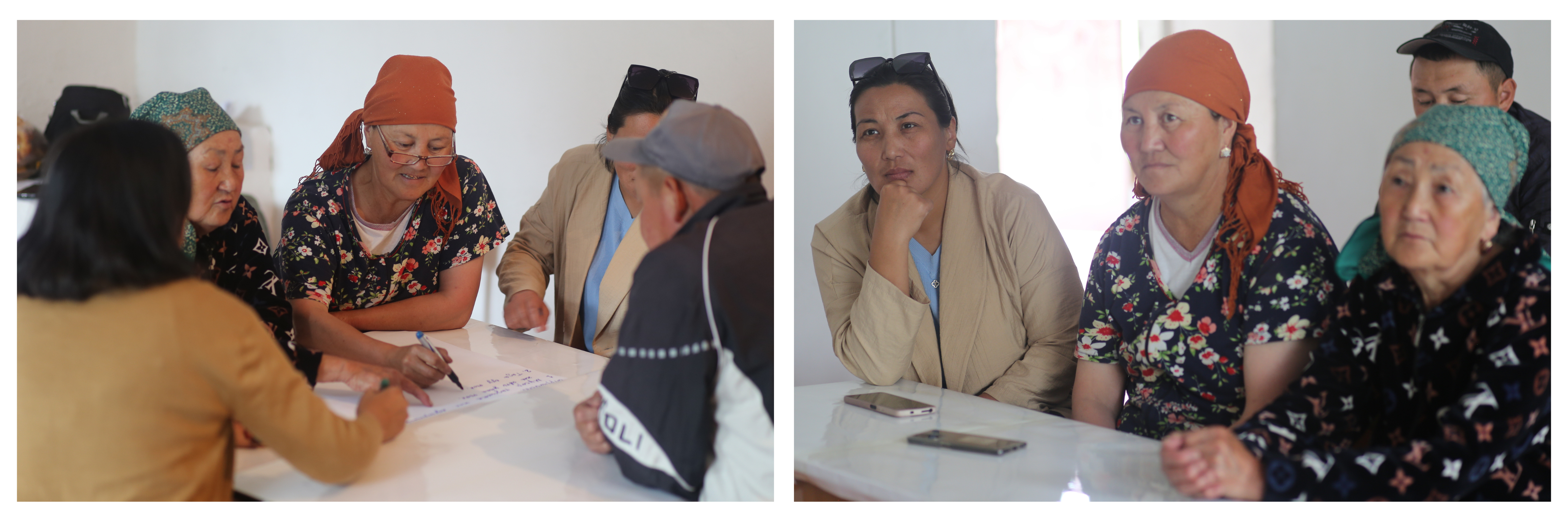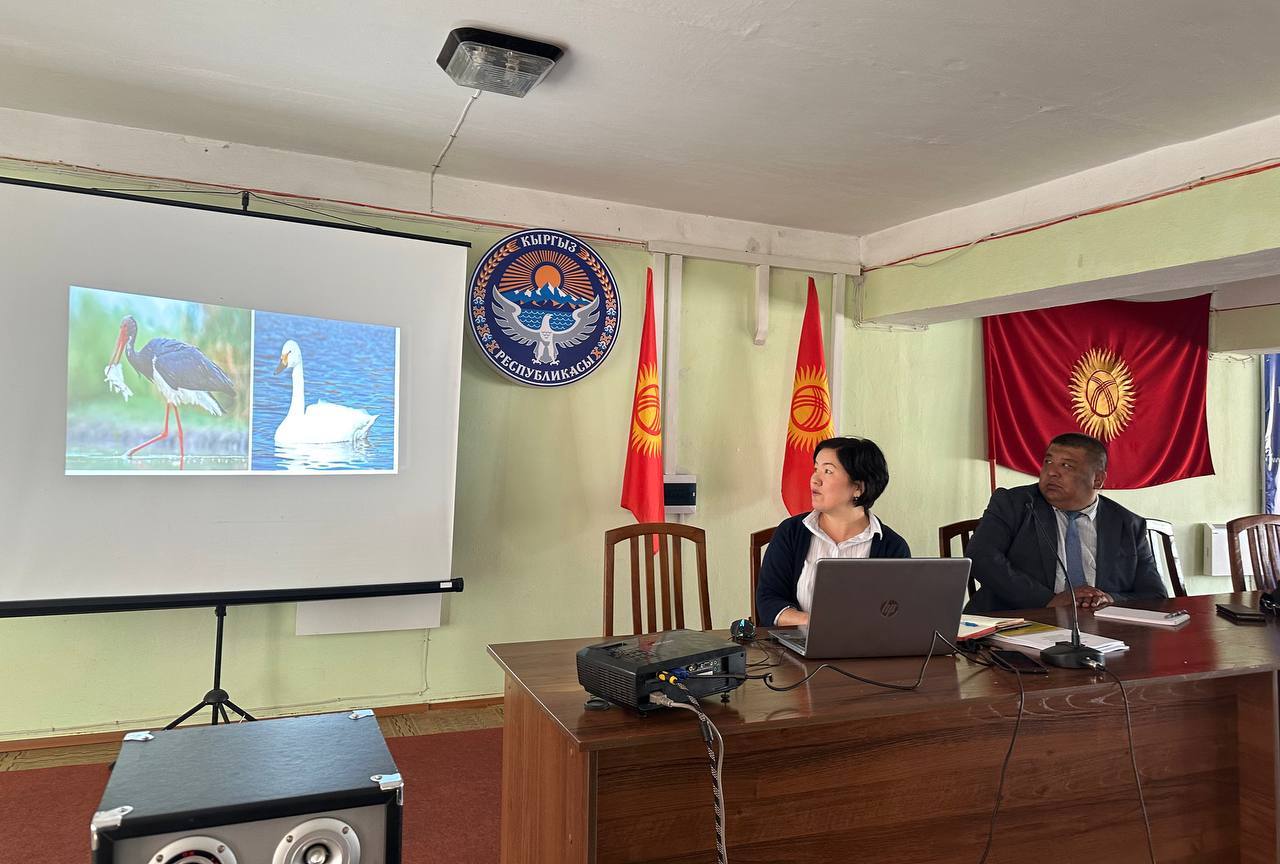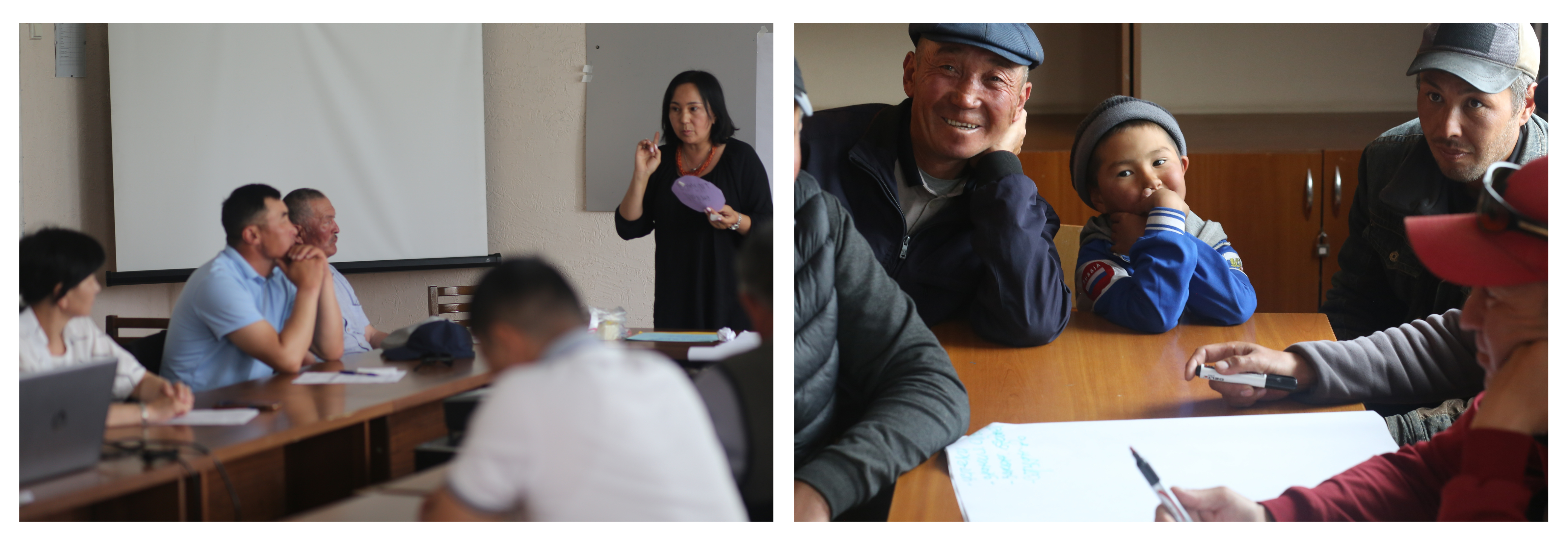Featured image: Anara Momunova, ISDS, and Baktygulov Tursunbek, deputy akim (head) of the Kochkor district authority.
In 2023, Centralasiengrupperna initiated a new format of cooperation with local partners in Central Asia, allowing for long-term support. Funded by SIDA via ForumCiv’s Large Partnership Funding program, the new collaboration format enables us to provide sustainable and lasting support to our partners, which marks an important step in CAG’s ongoing progress from project-oriented work towards long-term partnerships.
In April, we initiated a new project with our local partner in Kyrgyzstan, the Institute for Sustainable Development Strategy (ISDS), within the renewed format of cooperation. This blog post focuses on the joint project, shedding light on its objectives and the activities that have been undertaken.
The objective of the project is to protect and restore the pilot ecosystems of Son-Kul Lake. This involves strengthening the coordination of key stakeholder’s activities and building their capacity to sustainably manage the wetlands of the Son-Kul pilot area. Together with ISDS, we aim to support the local communities in Sary Bulak, Cholpon, and Kochkor rural municipalities located in Naryn province in the Kyrgyz Republic. Our goal is to help these communities claim their rights and gain control of their lives by protecting and preserving the wetland ecosystems of Son-Kul Lake, which is recognized as one of the International Bird and Biodiversity Areas (IBAs). The project will enable local communities, particularly women and youth, to exercise their rights to a healthy environment and equally participate in decision-making processes that have an impact on their livelihoods, communities and the environment.
In the long term, our strategy involves replicating and scaling up the successful practices to the Ak-Kya and Son-Kul local self-governments and the local communities engaged in livestock grazing in the pilot area.
As part of the project, a series of meetings took place during the spring, involving key stakeholders from various institutions and organizations, including decision-makers, scientists and local community members. During the meetings, the project, its approaches, and primary activities were discussed.
For instance, on April 11, ISDS held a meeting with biologist Askar Davletbakov from the National Academy of Sciences of the Kyrgyz Republic to discuss the project and planned activities in 3 pilot rural municipalities of the Kochkor region. One of the issues addressed during the meeting was the necessity of creating better nesting conditions for mountain geese, which have disappeared from Son-Kul Lake since 2005 due to disturbances caused by fishermen, livestock, and unregulated tourism.
On April 19, a working meeting was conducted with representatives from the National Academy of Sciences of the Kyrgyz Republic, Karatal-Zhapyryk Reserve, and the Department of Biodiversity Conservation and Protected Areas, to discuss cooperation and explore potential solutions for the challenges faced by the Son-Kul wetlands. This led to a proposal to develop a four-sided memorandum of mutual cooperation.
Another meeting on May 19 involved planning awareness-raising activities, capacity-building for local communities, and addressing issues such as pasture degradation, waste management, and biodiversity conservation. Representatives from the Kochkor region’s District Administration and the Sary-Bulak, Cholpon, and Kochkor rural municipalities took part in the event. During the meeting, Tursunbek Baktygulov, Deputy Akim of the Kochkor district administration, expressed strong support for the project and emphasized the administration’s commitment to providing assistance. Since 2023, the administration has been actively addressing the issues surrounding Son-Kul Lake. For instance, instead of relying on pasture unions to raise funds for repairing pasture roads, the Road Maintenance Department has been assigned to take this issue under its own responsibility. Various suggestions were made during the meeting, including conducting educational work among shepherds and the community to focus on the state of pastures, wetlands, nomadism, grazing timing, and establishing an ecological post on the road to Son-Kul Lake for visitor information and monitoring purposes.
During the meeting. Representatives of Kockor, Sary-Bulak and Cholpon ayil aimaks (rural municipalities).
On June 13-14, ISDS held a training session for local activists, local kenesh deputies, pasture users’ unions, and village leaders. The purpose of the training was to form an initiative group and develop action plans focused on priority needs related to the protection and sustainable management of natural resources and wetlands in the Son-Kul area.
The training aimed to enhance the participants’ capacity in understanding the concept of sustainable development through a lens of human rights, gender equality, and equity. It also aimed to establish women’s and youth groups to effectively utilize, manage, and conserve natural resources and wetlands.
The joint action plans were developed based on the community’s priority needs. The participants were divided into small groups, where they engaged in discussions about the environmental condition in their region, with a specific focus on the Son-Kul ecosystem.
The training session with Asel Dunganaeva.
The first group discussed the current situation and identified positive impacts on natural resources and wetlands resulting from human activities, giving examples of best practices. In particular, they highlighted the proactive measures taken by pasture committees and the local community to develop and preserve the ecosystems of Son-Kul Lake, despite limited financial resources. The activists of Cholpon Pasture Committee shared their achievements in addressing local community and pasture-related issues, for example the improvement in ecological awareness and understanding among the population due to conducting large-scale explanatory work among the local population and capacity-building initiatives for activists. Another achievement is an active campaign against poaching that is being conducted. Additionally, local youth are becoming involved in the development of ecotourism. Together with the National Academy of Sciences, they study the diverse species of animals and plants in Son-Kul. Infrastructure improvements, such as building bridges over livestock-crossing rivers and repairing water reservoirs and fences, have also been highlighted among the main achievements.
The second group focused on describing the current situation and identifying the negative impacts on natural resources and wetlands caused by human activities and climate change. Based on the joint assessment of participants’ needs, several pressing issues were identified:
- Drinking and irrigation water shortages, along with decreased rainfall and hot summers.
- Conflicts over pasture usage.
- Excessive accumulation of garbage.
- Overgrazing of livestock on the pastures of Son-Kul.
- Grass scarcity.
- Infrastructure challenges: poor road conditions and aging bridges.
- Increased mink population, which preys on fish, leading to a decline in fish populations.
- Inadequate budget allocation for pasture development.
- High cost of feeding livestock.
- Lack of volunteer activists willing to work for the development of the community.
- The use of electric fishing rods by fishermen,
- Underdeveloped horticulture.
As a result of the training, initiative groups were created in Sary-Bulak and Kochkor municipalities, and based on the results of the work in the groups, community action plans (CAPs) for 2023-24 were developed to resolve the above problems, indicating activities, resources, deadlines, and responsible persons. The CAPs were handed over to the leaders of the initiative groups for the preparation of appeals to local self-governing bodies and other responsible structures.
During the training session. Rita Ismailova, a leader of the initiative group of the Kochkor rural municipality.
 During the training session. Leaders of Sary-Bulak rural municipalities working on Community Action Plan.
During the training session. Leaders of Sary-Bulak rural municipalities working on Community Action Plan.
For the upcoming moths, we have planned a series of activities. These include monitoring of pastures in the pilot territories of Son-Kul in cooperation with the Scientific Research Institute of Animal Husbandry and Pastures of the Kyrgyz Republic, development and installation of information boards, and holding “Birds of Son-Kul” community festival.
Stay updated about Centralasiengrupperna’s work by following our social media:
- CAG’s Instagram page: https://www.instagram.com/centralasiengrupperna/
- CAG’s Facebook page: https://www.facebook.com/Centralasiengrupperna
You can learn about how you can become our member here!
To find out more about ISDS, follow the links below:
- Website: http://www.isds.kg/index.php/en/
- Instagram: http://www.instagram.com/isdsfund/




